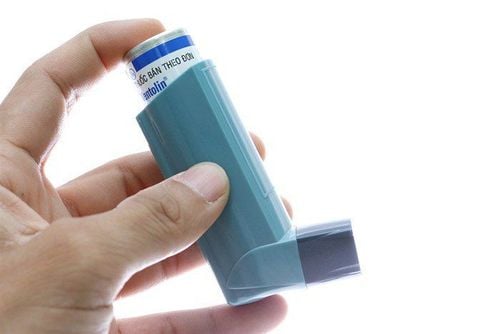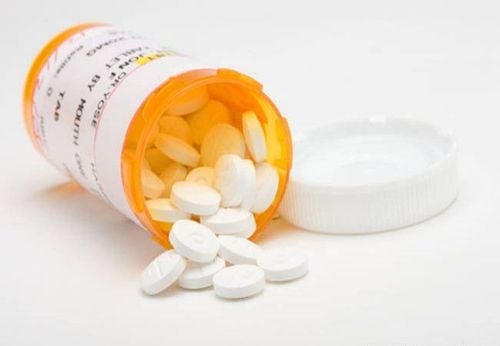This is an automatically translated article.
Pretmetason belongs to the group of Glucocorticoids, containing the main ingredient is Dexamethasone. The drug has anti-inflammatory, anti-allergic and immunosuppressive effects. The following article provides you with information about the uses and precautions when using Pretmetason.
1. What are the uses of Pretmetason?
Pretmetason drug has the main active ingredient is Dexamethasone, the drug is prepared in the form of tablets with a content of 5mg.
Dexamethasone is fluomethylprednisolone, a synthetic glucocorticoid and almost insoluble in water. Glucocorticoids work by binding to receptors in cells, then translocating into the cell nucleus, where the drug affects a number of genes to be translated. Dexamethasone also has some direct effects that are not mediated by binding to the receptors.
Dexamethasone has the main effects of glucocorticoids are antiallergic, inflammatory and immunosuppressive, but Dexamethasone has little effect on electrolyte balance. In terms of anti-inflammatory effects, Dexamethasone is 30 times stronger than Hydrocortisone and Prednisolone 7 times.
Dexamethasone is used in the treatment of conditions where corticosteroids are indicated such as bleeding shock, surgery, trauma, infection; inflammatory and soft tissue diseases; brain edema due to brain tumor. Dexamethasone is also used in the short-term treatment of acute allergies, such as neuro-angioedema; acute or aggravating episodes of chronic allergic disease. At pharmacologically active doses, systemic dexamethasone inhibits corticotropin release (ACTH) from the pituitary gland, which causes the adrenal cortex to stop secreting endogenous corticosteroid hormones (possibly secondary to adrenocortical insufficiency). . If dexamethasone is necessary for long-term treatment, the lowest possible dose should be used.
2. Indications and contraindications of the drug Pretmetason
Pretmetason is used in the following cases:
Severe allergies, inflammatory skin diseases, arthritis, severe or chronic bronchial asthma, intestinal infections, cancer and autoimmune diseases. Prevent and relieve symptoms of inflammation (redness, swelling, pain, itching) in any part of the body. Pretmetason 20mg is contraindicated in the following cases:
Allergy, hypersensitivity to Dexamethasone or any component of Pretmetason. Local viral infections, systemic fungal infections. Tuberculosis and gonorrhea infections are not controlled by antibacterial drugs.
3. How to take Pretmetason
Pretmetason is used orally with reference doses as follows:
Initial dose in adults: take 2-18 tablets / day, depending on the disease condition, divide the dose into 2-4 times / day. In less severe cases, a lower dose of 1 tablet/day can be used. If the disease is more severe, a higher dose of 18 tablets/day may be required. Children: Use Pretmetason for children from 6 years of age and older, dose 0.02 - 0.3mg/kg/day, divided dose into 3-4 times/day. Pretmetason overdose and management:
Dexamethasone overdose causing acute poisoning or death is very rare. Currently there is no specific antidote for dexamethasone. There is no indication for the treatment of chronic dexamethasone poisoning, except in cases where the patient is hypersensitive to corticosteroids; Treat symptoms as needed. If the patient develops a hypersensitivity reaction or anaphylaxis can be treated with CPR, Epinephrine and Aminophylline.
4. Side effects when using the drug Pretmetason
Common :
Electrolyte disturbances: Hypokalemia, sodium and water retention causing edema and hypertension. Endocrine and metabolic: Cushing's syndrome, adrenal atrophy, decreased secretion of ACTH, menstrual disorders, impaired glucose tolerance. Musculoskeletal: Osteoporosis, pathological fractures, aseptic osteonecrosis, spina bifida, reversible muscular atrophy. Gastrointestinal: Peptic ulcer, gastrointestinal bleeding, perforated ulcer, acute pancreatitis. Skin: Hirsutism, skin atrophy, erythema, ecchymosis. Nervous: Refreshing, insomnia. Uncommon:
Hypersensitivity reactions, sometimes anaphylactic shock. Leukocytosis, malaise, thromboembolism, appetite, weight gain, nausea, hiccups, sterile abscess. Symptoms and signs of drug discontinuation:
Too quickly reducing the dose of Pretmetason after long-term treatment can lead to acute adrenal insufficiency, hypotension and death. Stopping Pretmetason can sometimes cause symptoms similar to a relapse.
5. Notes when using Pretmetason 20mg
Patients with osteoporosis, psychosis, peptic ulcer, tuberculosis, diabetes, hypertension, heart failure, renal failure or patients who have recently undergone bowel surgery need close monitoring and aggressive treatment of diseases. this if it is necessary to use dexamethasone.
In patients with infection or suspected infection, pre-treatment with specific antibacterial drugs is necessary. Due to the immunosuppressive effect of dexamethasone, exacerbation and spread of infection may occur. However, patients with bacterial meningitis need to use dexamethasone before taking specific antibacterial drugs, this is to prevent encephalitis caused by a reaction to bacterial debris killed by antibacterial drugs.
Pregnant women: Dexamethasone can reduce the weight of the fetus and the weight of the placenta. Dexamethasone can also cause adrenal suppression in infants if the mother takes it for a long time. Use of glucocorticoids has the ability to prevent the risk of neonatal respiratory distress syndrome and bronchopulmonary dysplasia in premature infants.
Lactating women: Dexamethasone is excreted in breast milk, so the use of Pretmetason may be risky for the nursing infant.
6. Drug interactions
Avoid concomitant use of Pretmetason with the following drugs: Everolimus, Natalizumab, Nisoldipine, Nilotinib, Tolvaptan, Ranolazine, live attenuated vaccines. Dexamethasone may increase the effects of Amphotericin B; acetylcholinesterase inhibitors, Cyclosporin, Natalizumab, Lenalidomide, Thalidomide; non-steroidal anti-inflammatory drugs (non-selective), non-steroidal anti-inflammatory drugs (COX-2 inhibitors); thiazide diuretics, loop diuretics; Warfarin. The effect of Dexamethasone may be increased if used concomitantly with: antifungal agents (azol derivatives); calcium channel blockers (not dihydropyridine); strong and moderate CYP3A4 inhibitors; estrogen derivatives; P-glycoprotein inhibitors; neuromuscular blocker (non-depolarizing); quinolone antibiotics; salicylates; dasatinib; trastuzumab. Dexamethasone may decrease the effect of CYP3A4 substrates, P- glycoprotein substrates; antidiabetic drugs; calcitriol ; isoniazid; nilotinib; salicylates; tolvaptan; sorafenib; vaccine (inactivated). The effect of Dexamethasone may be reduced by Barbiturates; p-glycoprotein inducers; antacids; Rifamycin. Patients prescribed systemic corticosteroid therapy may require a diet that increases potassium, vitamin A, vitamin B6, vitamin C, vitamin D, calcium, folate, zinc and phosphorus, and reduces sodium. Barbiturates, Rifampicin, Phenytoin, Carbamazepine, Aminoglutethimide may increase the clearance of Dexamethasone, thereby reducing the therapeutic effect of the drug. Dexamethasone antagonizes the effect of hypoglycemic agents (including insulin), antihypertensives and diuretics. Corticosteroids potentiate the hypokalemic effect of thiazide diuretics or furosemide and amphotericin B. The anticoagulant coumarin derivatives, when used concurrently with pretmetason, may increase the anticoagulant effect, so prothrombin time should be closely monitored to avoid spontaneous bleeding. Salicylates increase clearance when used concomitantly with dexamethasone, so when stopping the drug is prone to salicylate toxicity. The article has provided information about the uses, dosage and precautions when using Pretmetason. To ensure safety for your health and maximize the effectiveness of your treatment, you need to take Pretmetason exactly as directed by your doctor.
Please dial HOTLINE for more information or register for an appointment HERE. Download MyVinmec app to make appointments faster and to manage your bookings easily.













